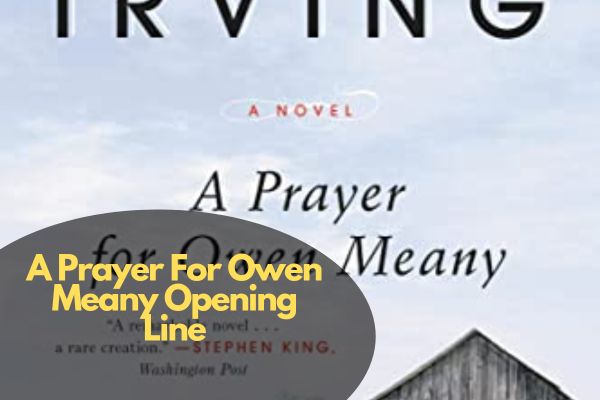One such compelling beginning sentence may be found in John Irving’s novel “A Prayer for Owen Meany.” This article goes into the significant influence of beginning lines, specifically the first line of “A Prayer for Owen Meany,” and examines its relevance within the novel’s background.
A Prayer For Owen Meany Opening Line
The opening line of John Irving’s novel, “A Prayer for Owen Meany,” is as follows:
“I am doomed to remember a boy with a wrecked voice—not because of his voice, or because he was the smallest person I ever knew, or even because he was the instrument of my mother’s death, but because he is the reason I believe in God; I am a Christian because of Owen Meany.”
This gripping opening line immediately grabs the reader’s attention and raises numerous questions. It introduces the narrator, highlights the significance of a remarkable individual named Owen Meany, and hints at the profound impact he has had on the narrator’s faith. Through this line, John Irving sets the tone for a story that intertwines faith, destiny, friendship, and the power of belief.
The Significance of Opening Lines in Literature
Opening lines in literature play a crucial role in captivating readers and drawing them into the story. They provide a glimpse into the author’s style, establish the tone, and create intrigue. A well-crafted opening line has the power to evoke emotions, raise questions, and pique curiosity, compelling readers to continue reading. It sets the stage for the narrative, introduces key themes, and foreshadows what is to come. Through the artful use of language and imagery, opening lines can leave a lasting impression on readers, inviting them to embark on a literary journey.
Analysis of the Opening Line
Setting the Tone and Establishing Themes
The opening line of “A Prayer for Owen Meany” sets a tone of mystery, melancholy, and contemplation. It foreshadows the weighty themes that will be explored throughout the novel, such as destiny, faith, and the interconnectedness of events. By introducing the idea of being “doomed to remember,” the line immediately suggests that the story will look into significant and life-altering experiences.
Creating Intrigue and Captivating the Reader
The opening line captivates the reader through its enigmatic nature. It presents a series of paradoxes, such as a “boy with a wrecked voice” who becomes the reason for the narrator’s faith. These contradictions raise questions and spark curiosity, urging readers to explore deeper into the narrative to uncover the truth behind these statements.
Foreshadowing and Symbolism
The line also serves as a form of foreshadowing, hinting at the central role Owen Meany will play in the narrator’s life. It suggests that Owen’s unique qualities and experiences will shape the narrator’s perspective on God and Christianity. Additionally, the mention of Owen Meany as the “instrument of my mother’s death” hints at a tragic event that will likely be explored further in the story.
Owen Meany and the Power of Faith
Owen Meany, as introduced in the opening line, becomes a symbol of unwavering faith and belief. The line suggests that Owen’s presence and actions have had such a profound impact on the narrator’s life that they are the reason for the narrator’s Christian faith. Owen’s character embodies a strong sense of purpose, destiny, and a deep connection to a higher power.
Impact on the Reader
The opening line of “A Prayer for Owen Meany” leaves a lasting impression on the reader. It raises questions, creates intrigue, and establishes a desire to uncover the narrative’s mysteries. It sets the stage for a thought-provoking exploration of faith, friendship, and the complexities of human relationships. Readers are drawn into the world of the novel, eager to discover the significance of Owen Meany and understand the narrator’s journey of faith.
John Irving’s Writing Style
John Irving’s writing style is characterized by its rich detail, introspection and emotional depth. He expertly weaves together complex narratives, utilizing vivid descriptions and multifaceted characters. Irving’s prose is known for its thoughtfulness and evocative power, allowing readers to immerse themselves fully in the story. Through his meticulous attention to detail and skilful storytelling, he creates a captivating reading experience that resonates long after the book is finished.
The Art of Crafting Memorable Opening Lines
Crafting a memorable opening line is an art form that requires careful consideration. A successful opening line should grab the reader’s attention, introduce key elements of the story, and create an emotional connection. It should set the tone and provide a glimpse into the themes and style that will unfold throughout the narrative. By employing literary techniques such as imagery, symbolism, and foreshadowing, authors can create opening lines that leave a lasting impact on readers.
Examples of Other Memorable Opening Lines
- “It was the best of times; it was the worst of times.” Charles Dickens, “A Tale of Two Cities”
- “Call me Ishmael.” – Herman Melville, “Moby-Dick”
- “It is a truth universally acknowledged, that a single man in possession of a good fortune, must be in want of a wife.” – Jane Austen, “Pride and Prejudice”
- “All happy families are alike; each unhappy family is unhappy in its way.” – Leo Tolstoy, “Anna Karenina”
- “In a hole in the ground, there lived a hobbit.” – J.R.R. Tolkien, “The Hobbit”
Conclusion
The opening line of a novel holds immense power in shaping the reader’s experience. In the case of “A Prayer for Owen Meany,” John Irving’s masterful opening line immediately captures the reader’s attention and sets the stage for a thought-provoking exploration of faith, destiny, and friendship.
Through its enigmatic nature, symbolism, and skilful storytelling, the opening line establishes the tone and themes that will unfold throughout the narrative, leaving a lasting impression on readers.






